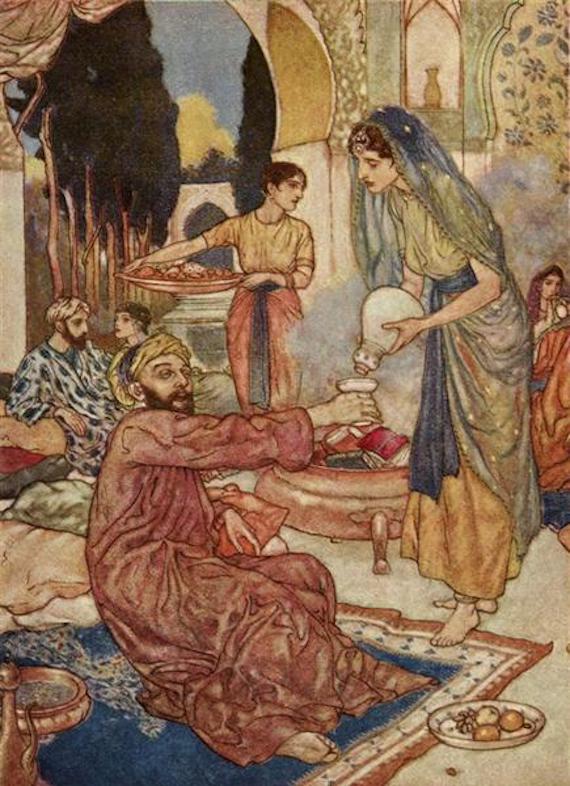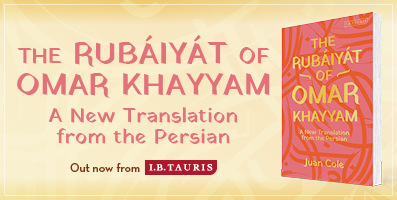Ann Arbor (Informed Comment) – President Biden on Thursday expressed the expectation that the vaccination of the US population will have proceeded to the extent by July 4 that we can look forward to small gatherings of friends and family then. The calculation is that when 70% of the population is inoculated, the virus will begin its own little death spiral, as it looks desperately for a new host and can’t find one that isn’t already immune. The virus will starve in a sea of vaccinated Americans no longer vulnerable to it.
As we look forward to a declaration of independence from the novel coronavirus on July 4 and the cautious return of some good times, I thought I’d share some new translations of the poetry of the original good time Charlie of medieval times, Omar Khayyam. This poetry celebrates wine, song and lovers, and living in the moment in the face of the inexorable approach of death. Although it was attributed to the mathematician and astronomer Omar Khayyam (d. 1132), it is actually folk poetry, and kept being written all through medieval and early modern times in Iran and India.
The poems I’m sharing today are not in my book of Khayyam translations, and I think a lot of them are Indian in origin. They were collected by the nineteenth-century British scholar E. H. Whinfield. In my book, I translated the quatrains (that is what rubaiyat means) as four-line free or blank verse, but in these translations I am trying out a bit of rhyme along with an iambic meter (some are pentameter, others different foot lengths). For the form of the English rubaiyat, in which Robert Frost, T.S. Elliott, Ezra Pound and other great poets engaged, see How to write Rubaiyat.
Whinfield 44
To drink up like a blossoming spring rose
with someone rosy-cheeked would be sublime.
Let’s sip some wine with joy, since brooding fate
may scatter us like wind at any time.
Whinfield 58:
We’re infidels of love, and faith is something else.
We’re ants, and Solomon’s renown is something else.
We’re sallow-cheeked; our clothes are old and tattered now:
The glorious new silk bazaar is something else.
Whinfield 60:
Not fit for praying in a mosque or church,
God knows what clay he made me from– that of
a cynic-mystic or an ugly tart? —
my hopes don’t lie in this world or above.
Whinfield 71:
Now that the bloom is on the rose of bliss,
don’t hesitate to raise a wine glass high.
Drink up, for your determined foe is time;
you won’t again come by a day like this.
Whinfield 86
Without red wine the course of this life has no joy–
without the strains of an Iraqi flute, no joy.
For every time I contemplate this world’s affairs
I see its pleasures; in the rest there is no joy.
Whinfield 88:
What’s being, then, if death is the reality?
What is the road to our impossible desires?
No layover will offer any benefit,
and when the journey’s done what kind of rest transpires?
Whinfield 93:
My heart is dark; I’m looking for your light.
I am a sinner, seeking out your grace.
If heaven’s only for obedience,
it’s just a wage; where is your kind embrace?
Order from
or Nicola’s Books in Ann Arbor, who will ship it to you
or Literati Bookstore in Ann Arbor, who will ship it to you
or Barnes and Noble, who will ship or do curbside delivery.
or Amazon
Reviews:
“’To read Juan Cole’s deft, plain-spoken translation of the Rubáiyát
is to find companionship, to rejoin a thousand-year human
conversation about how to endure, enjoy, and find a fleeting beauty
in everlastingly dire times. The lucid, cogent and mind-opening
Epilogue is a kind of grace, a gift freely given, from one of our
most astonishing and generous intellects.’”
– Michael Chabon, Pulitzer Prize winner and author of Moonglow (2017)
“’Omar Khayyam is a Persian treasure and Juan Cole’s new
translation brings him anew to Western audiences who
for centuries have been both delighted and educated by this
medieval sage! Reading The Rubáiyát is a thrill – you feel the
echoes of the 12th century seamlessly into our 21st, as this is
a holy book of wisdom and magic. In another perilous era for
Iranians, it’s wonderful to see this enchanting volume make
its way through the world yet again!’”
– Porochista Khakpour, novelist, essayist and author of Brown Album (2020)
Featured illustration: “A New Marriage, The Rubaiyat of Omar Khayyam” by
Edmund Dulac. .




 © 2025 All Rights Reserved
© 2025 All Rights Reserved